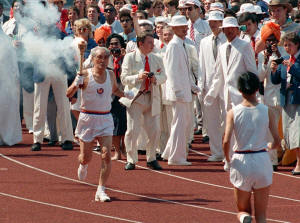Lessons in Olympic spirit from 'Japan's' Korean gold medallist live on
 Send a link to a friend
Send a link to a friend
 [July 14, 2021]
By Chang-Ran Kim [July 14, 2021]
By Chang-Ran Kim
YOKOHAMA, Japan (Reuters) - Long before American sprinters Tommie
Smith and John Carlos made history with their Black Power salute at
the 1968 Olympics, another poignant image of silent protest was
etched into the conscience of Koreans – and largely forgotten
everywhere else.
At the Berlin Olympics in 1936, Korean Sohn Kee-chung stood with his
head hung, hiding the rising-sun flag on his chest with a laurel
plant as Japan's national anthem filled the stadium to honour his
marathon victory. The moment filled him with "unbearable
humiliation", he recounted in his autobiography, and marked the
beginning of an anguished chapter in his life.
Worried that his triumph would spark an insurgence among ethnic
Koreans, Japan - which ruled Korea from 1910 to 1945 - forbade Sohn
from competitive running, kept him under tight surveillance, and
even used his celebrated status to recruit young Koreans for its war
effort. Sohn called the recruiting the "greatest regret" of his
life.
Still, Sohn harboured no resentment toward his former oppressors in
later years and dedicated his life to promoting "Olympism" – or
peace through sports – particularly between Japan and Korea, his
son, Chung-in, told Reuters in a recent interview.

"All he wished for was for both sides to recognise what happened in
the past so we don't repeat it, and instead look forward," he said.
'UNCOMFORTABLE TOPIC'
With bilateral relations at a nadir today, https://www.reuters.com/article/us-olympics-2020-southkorea-japan-idUSKCN2EF0QG
mostly over wartime atrocities, Sohn's message remains relevant,
said Zenichi Terashima, professor emeritus at Tokyo's Meiji
University, who published the runner's biography two years ago.
For all of Sohn's efforts at reconciliation, Japan has had an
awkward relationship with him and his legacy, Terashima said,
speaking alongside his son.
Sohn is a national hero in South Korea, but few in Japan
have heard of him, even though his medal remains the only Olympic
gold for the men's marathon in Japan.
Only an eagle-eyed visitor to the new Olympic museum in Tokyo will
notice both mentions of Sohn: one among a display of Japanese gold
medallists and another in a tiny sign accompanying the Olympic torch
used in the Seoul Games in 1988 describing him as the final torch
relay runner.
"He's an uncomfortable topic in Japan," said Terashima, who said he
felt compelled to publish Sohn's life story amid what he perceived
as a resurgence of historical revisionism among Japan's conservative
elite.
OLIVE BRANCH
Sohn scrupulously avoided politics and extended an olive branch
wherever he saw a chance.
[to top of second column] |

Sohn Kee-chung carries a torch in the
opening ceremony of 1988 Seoul Olympic Games in Seoul, South Korea
in this photo taken by Kyodo in September 1988. Picture taken in
September 1988. Mandatory credit Kyodo/via REUTERS

When Japanese runner Shigeki Tanaka
won the Boston marathon in 1951, Sohn sent him a congratulatory
message, calling his win "a win for Asia", his son said. He signed
off using the Japanese transliteration of his name – Son Kitei – a
profound gesture from a man who insisted on signing autographs in
Korean even in 1936.
It should have been a bitter moment.
The previous year, Sohn had coached the Korean team that swept
first, second and third places at the marquee race, only to be
denied entry in 1951 as the Korean War raged.
At Seoul 1988, Sohn had secretly planned to gift a replica of the
ancient Corinthian helmet given to him as Berlin's marathon winner
to a Japanese runner if they won a medal, his son recalled.
Sohn was ecstatic about Japan and South Korea's co-hosting of the
2002 FIFA World Cup, instructing his son to help make it a success
so "the past could be left in the past for a fresh start", Chung-in
said. Sohn died a few months after the event.
The thaw in bilateral ties proved short-lived, but "my father died a
happy man," Chung-in said.
The current diplomatic chill has spilled over into the Olympics
https://www.reuters.com/article/uk-olympics-2020-southkorea-japan-idUKKCN2DD2QP
in the form of a territorial dispute over the labelling of a set of
islands - both at the Pyeongchang Olympics in 2018 and this year.
But Terashima says the "Olympism" that Sohn advanced thrives in the
activism of Naomi Osaka today and the borderless bonds shared by
speedskaters Nao Kodaira and Lee Sang-hwa, whose emotional embrace
after their race at Pyeongchang, draped in the Japanese and Korean
flags, moved many on both sides of the sea https://www.reuters.com/article/csports-us-olympics-2018-skat-kodaira-le-idCAKCN1G317S-OCASP.
"My father liked to say that in war, whether you win or lose, if a
bullet hits you, you die," Chung-in said. "But that in sports, even
if you lose, you can still be friends."

(Reporting by Chang-Ran Kim. Editing by Gerry Doyle)
[© 2021 Thomson Reuters. All rights
reserved.]
Copyright 2021 Reuters. All rights reserved. This material may not be published,
broadcast, rewritten or redistributed.
Thompson Reuters is solely responsible for this content. |